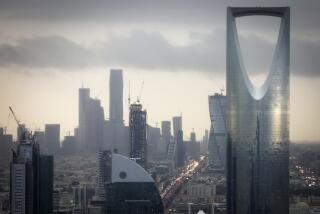Malaysian Dreams, Bev Hills Bucks
For most people in the West, remote Malaysia might as well be Fantasia. Too bad. Booming, budding, building-day-and-night Malaysia (east of India, north of Australia) is fast becoming one of those Asian-Pacific successes that business magazines glamorize, Asians look to for leadership and the West poorly understands. Regarded by its former British colonial masters (who ducked out in 1957) as little more than some Bali Hai suburb in nowheresville, today this Southeast Asian country is California’s eighth-largest export market. And, despite a modest population of 20 million, it is, for our exporting Western states, a bigger customer at this time than venerable France, regional ally Australia or even, amazingly, gigantic China. Malaysian exporters reciprocate the attention: After Japan, we’re their second leading customer.
Malaysia’s Prime Minister Mahathir Mohamad, in California this week, knows that without Western dollars, not many Malaysian dreams will get off the ground. And is there a politician in the world with a more transparent edifice complex? These days modern Malaysia seems always to be erecting something. Recently it put the finishing touches on the world’s tallest building and is now gearing up to build the region’s biggest airport, a whole new high-tech capital city and the world’s longest building. But that’s not enough for Mahathir. His latest and most costly vision, the one that brings the prime minister to Los Angeles to woo deep-pocketed entertainment, new media and business moguls, is a blockbuster “multimedia supercorridor” that would be nine miles wide and 30 miles deep and forever ambitious. It aims to create nothing less than Asia’s own information technology city. The Mahathir corridor is to be one big techno-age Emerald City plunked down in the middle of a piece of Malaysia carved out as a world of its own. It’s his most recent attempt to fast-forward still-developing Malaysia into the 21st century. His pitch? If you want to sell information technology products in all the various Asian markets, it makes no sense to stay in San Jose.
Notwithstanding Mahathir’s occasional anti-West posturing, this unusual leader wants to rush to the future in partnership with America, and he may just pull it off. A master builder and a master politico, Mahathir has been prime minister and boss of all Malaysian bosses since 1981. Among Asians, only China’s desperately ailing Deng Xiaoping and Indonesia’s stubbornly clinging President Suharto have hung on longer. And so Mahathir, a sprightly 71 (not at all too old for an Asian politician) blew into town Sunday, at the invitation of the new UCLA School of Public Policy and Social Research, the Asia Society and the Beverly Hills Chamber of Commerce, ever-eager to drum up new business and contacts.
Mahathir is something else again--an Islamic regional leader hawking his large vision in Beverly Hills, but who back home takes enormous delight in cutting up the West, environmentalists of all stripes and anyone who stands in his way. This is the same guy who publicly and provocatively declaims that the West is in deep fear of Asia getting its act together (“It is the yellow peril all over again,” he said in a speech in Beijing), proclaims that the West wants to ram its “preferences down everyone’s throat,” and is hostage to out-of-control media that oppress Western leaders “the way people in feudal societies are oppressed by their own leaders.” That’s the Mahathir who plays to Asian grandstands. Then there’s the pragmatic leader who plays to Wall Street--and is here, now, in Tinseltown to talk up his latest edifice. For as much as he knocks the commercialism, pornography and violence in Western culture and entertainment, he knows real power when he sees it: “If you can’t fight them,” he said to me Monday in an interview, “you join them. . . . You cannot avoid Hollywood. That’s exactly why we’re here.”
West-bashing is as common in Asia as monsoons. Mahathir reemphasized his view Monday that the West places too high a priority on individual rights at the expense of community interests, too deeply resents any Asian criticism of its policies and values--”Countries like us normally do not voice our views because of certain fears”--and still does not grasp the looming importance of the region. The Clinton administration, he said, “should get more involved in Asia.”
To understand what’s bugging Mahathir, you have to recognize Malaysia’s yawning identity crisis. Only for as long as this crafty politician delivers economic growth at a phenomenal 8% or so a year, as his government has for the last nine years, will his people continue to accept the upsetting dislocations attendant to hurtling modernization. Malaysia, after all, is a country fighting underneath all the glitz to reconcile deeply traditional Islamic roots with the need to continue to modernize and internationalize. So in a sense this whole amazing supercorridor project is also one big metaphor for the modernizing of Asia today: the struggle to shed the outer skin without losing the inner essence. Mahathir is just the man to give his Asian publics the occasional dose of their medicinal anti-Westernism while at the same time making nice to the West, assuring us that he’s a man with whom we can do business. Because hardly anyone is better at this clever game than he, Malaysia, and in fact America, benefits.
More to Read
Inside the business of entertainment
The Wide Shot brings you news, analysis and insights on everything from streaming wars to production — and what it all means for the future.
You may occasionally receive promotional content from the Los Angeles Times.










